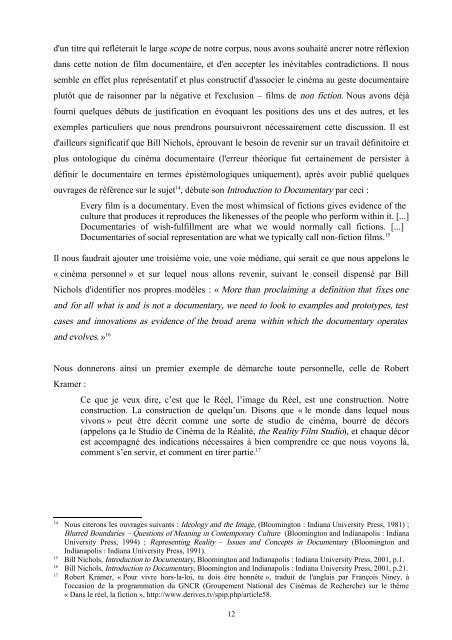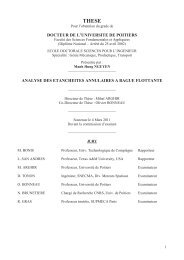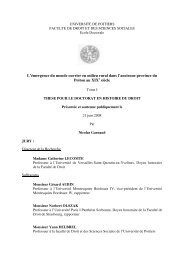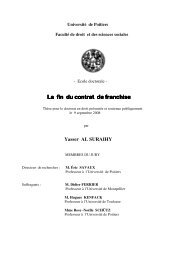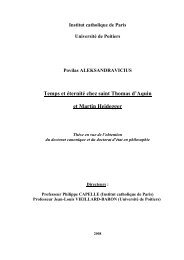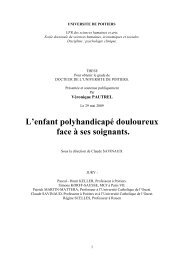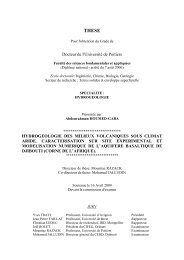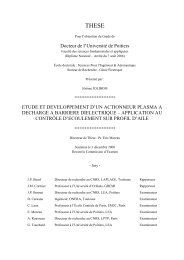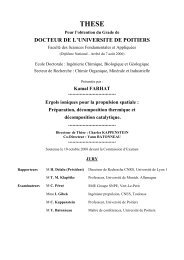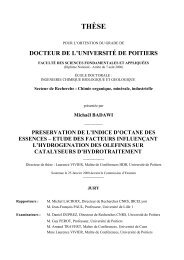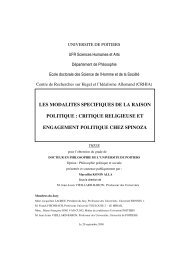- Page 1 and 2: UNIVERSITÉ DE POITIERS Faculté de
- Page 3 and 4: Remerciements Nous tenons en tout p
- Page 5 and 6: PLAN DE THÈSE Formes et manifestat
- Page 7 and 8: CHAPITRE 5 : Le sujet-cinéaste et
- Page 9 and 10: documentaire. Afin de mener à bien
- Page 11: fundamental as the antagonism betwe
- Page 15 and 16: ou britannique, qui opère de fréq
- Page 17 and 18: puisque les attentes en question so
- Page 19 and 20: oxymore, ou tout au moins comme une
- Page 21 and 22: se tourne, il semble difficile de f
- Page 23 and 24: « corps de la bête », à être
- Page 25 and 26: sur la ville de Lausanne dans sa Le
- Page 27 and 28: entame au petit jour avec Nicholas
- Page 29 and 30: CHAPITRE I Topiques du film documen
- Page 31 and 32: A- Vers une définition syncrétiqu
- Page 33 and 34: filmiques (une famille qui, comme l
- Page 35 and 36: précis à donner à ce genre litt
- Page 37 and 38: l'essai serait d'être pluriel, pol
- Page 39 and 40: cette liberté et cette subjectivit
- Page 41 and 42: qui parle de composer un essai sur
- Page 43 and 44: and interesting as possible. » 39
- Page 45 and 46: En 1936, dans l’essai intitulé
- Page 47 and 48: Ralph Waldo Emerson. Métaphore du
- Page 49 and 50: temps et de l'espace. La cinéaste
- Page 51 and 52: B- Influences romantiques et emerso
- Page 53 and 54: l’expérience du cinéaste, le ci
- Page 55 and 56: Ralph Waldo Emerson de la chaire de
- Page 57 and 58: période donnée, participait d’u
- Page 59 and 60: agreeable is the picture, though yo
- Page 61 and 62: efuses to lend itself to any other
- Page 63 and 64:
sonnet Opening the Cage sous la plu
- Page 65 and 66:
idéologique telle qu'il est diffic
- Page 67 and 68:
comme usage de soi (« tissu » et
- Page 69 and 70:
lâche de résonances et de référ
- Page 71 and 72:
Cinéma autobiographique, cinéma d
- Page 73 and 74:
métaphorique. Une telle subjectivi
- Page 75 and 76:
L’hypothèse ontologique du ciné
- Page 78 and 79:
CHAPITRE II L'héritage disputé de
- Page 80 and 81:
A- Visions métaphoriques du monde
- Page 82 and 83:
Electre, Jason, et enfin et surtout
- Page 84 and 85:
Pandora's trap.. » 11 . La culpabi
- Page 86 and 87:
L'intérêt personnel à investir l
- Page 88 and 89:
through a willingness to dance with
- Page 90 and 91:
et les dilatations de la vision pri
- Page 92 and 93:
Une sorte de face-à-soi pratiqué
- Page 94 and 95:
n'effectue pas d'oppositions binair
- Page 96 and 97:
WWBM instaure ainsi un jeu combiné
- Page 98 and 99:
Lumière, eau, fenêtre, sang, corp
- Page 100 and 101:
On pourrait aussi croire que la man
- Page 102 and 103:
cette tentative de reconstitution.
- Page 104 and 105:
les photos) qui annonce les plans i
- Page 106 and 107:
story of a man who climbs a mountai
- Page 108 and 109:
poursuit sa marche en avant, fragil
- Page 110 and 111:
métaphorique de type anthropomorph
- Page 112 and 113:
Philip Adams Sitney présente Stan
- Page 114 and 115:
defensive of the Sel's last-ditch s
- Page 116 and 117:
2) Le processus d'identification d'
- Page 118 and 119:
verite should imply a way of lookin
- Page 120 and 121:
my prejudice is under and in everyt
- Page 122 and 123:
être pas toujours aussi claire et
- Page 124 and 125:
filmique à partir d'un enregistrem
- Page 126 and 127:
pour l'occasion. C'est sur ces ques
- Page 128 and 129:
On trouve par exemple des effets de
- Page 130 and 131:
La conciliation de ces consignes es
- Page 132 and 133:
tournage et le vendeur se présenta
- Page 134 and 135:
saurait y avoir de tel contrat. L'i
- Page 136 and 137:
convention de représentants de com
- Page 138 and 139:
Prédestination...Celui qui demande
- Page 140 and 141:
manière idiosyncratique d'Irlandai
- Page 142 and 143:
fin du film documentant les vendeur
- Page 144 and 145:
C'est un autre film tristement cél
- Page 146 and 147:
The thing we name the individual, t
- Page 148 and 149:
David Holzman’s Diary ou encore N
- Page 150 and 151:
ouvrage Documentaires américains c
- Page 152 and 153:
1) David Holzman’s Diary ou « Le
- Page 154 and 155:
spectateur en provoquant le traditi
- Page 156 and 157:
direct américain d’une vérité
- Page 158 and 159:
En s’imposant comme une autobiogr
- Page 160 and 161:
américaine, celle de Jack Kerouac,
- Page 162 and 163:
choisi de marcher dans les pas d’
- Page 164 and 165:
l’œuvre dans ces films ne pourra
- Page 166 and 167:
« I gonna make my diary. My Diary
- Page 168 and 169:
monde, et qu’il distord et la ré
- Page 170 and 171:
an attractive form » 243 , comme l
- Page 172 and 173:
immédiate en est la présence visi
- Page 174 and 175:
le discours réflexif revendique os
- Page 176 and 177:
And I stop it when I want to, then
- Page 178 and 179:
en tant que propos : David écrit u
- Page 180 and 181:
interactive avec lui. L’emploi de
- Page 182 and 183:
En faisant en sorte que l’espace
- Page 184 and 185:
métaphore, le film critique l’au
- Page 186 and 187:
Alors qu’Eakin reconnaît l’int
- Page 188 and 189:
voulant, nous nous en souvenons, un
- Page 190 and 191:
se marier avec un autre alors qu'el
- Page 192 and 193:
- Qui vient en premier ? le cinéas
- Page 194 and 195:
trouvons une autre avec MG’s W, d
- Page 196 and 197:
de la nation ; le droit au divorce
- Page 198 and 199:
- Jim McBride and His Brid e : le p
- Page 200 and 201:
particulier son célébrissime port
- Page 202 and 203:
seraient qu’on l’appelle « the
- Page 204 and 205:
Malheur à moi donc, puisque je vie
- Page 206 and 207:
3) Dernier exemple de jeux de la v
- Page 208 and 209:
Ces mots sont ceux que Shelby Lever
- Page 210 and 211:
toute forme d’autorité, dont nou
- Page 212 and 213:
titre du film pressenti, le cauchem
- Page 214 and 215:
complètement incontrôlé, livré
- Page 216 and 217:
cités plus haut, à l’exception
- Page 218 and 219:
Or, si l’on fait glisser cette th
- Page 220 and 221:
vu avec les plans insistants des Fr
- Page 223:
216
- Page 226 and 227:
Introduction à la subjectivité f
- Page 228 and 229:
A- Quelques échos du passé : De q
- Page 230 and 231:
- Vers une redéfinition du code No
- Page 232 and 233:
accents dans la langue anglaise pou
- Page 234 and 235:
multiplicité des voix, invariant d
- Page 236 and 237:
texte filmique, par son milieu, pou
- Page 238 and 239:
permettent ainsi d’affiner les co
- Page 240 and 241:
- Un rejet des modèles (Modèle :
- Page 242 and 243:
Le point de vue de l’écrivaine a
- Page 244 and 245:
au premier plan, l’autre en arri
- Page 246 and 247:
cinéastes exposent et développent
- Page 248 and 249:
B- Des formes adaptées au sujet 89
- Page 250 and 251:
notre travail, car Emile de Antonio
- Page 252 and 253:
L’ « événement » devient alor
- Page 254 and 255:
Le gros plan est une des opération
- Page 256 and 257:
l’invention du gros plan est lié
- Page 258 and 259:
signifiante dans l’optique d’un
- Page 260 and 261:
ideology and text is effected. 128
- Page 262 and 263:
plages de silences là ou l’on at
- Page 264 and 265:
peut que s'y intéresser. On se sou
- Page 266 and 267:
seulement capable de penser une seu
- Page 268 and 269:
la politisation de la voix dont nou
- Page 270 and 271:
premier, la subjectivité avant l
- Page 272 and 273:
française, il s’agit de Jean-Cla
- Page 274 and 275:
existe indépendamment de son enreg
- Page 276 and 277:
Pour conclure, Sans Soleil soulève
- Page 278 and 279:
cinématographique, dans le but not
- Page 280 and 281:
Ce goût pour la performance fait q
- Page 282 and 283:
magnétique qui cristallise à lui
- Page 284 and 285:
is vital part of the act of represe
- Page 286 and 287:
flous sont à rechercher ailleurs :
- Page 288 and 289:
se termine. L’aspect performance
- Page 290 and 291:
statut d’auteure, grâce à l’a
- Page 292 and 293:
écompensées : « My films were ma
- Page 294 and 295:
purulente, constat sans appel de l
- Page 296 and 297:
statement about the interactions th
- Page 298 and 299:
La transparence de la relation suje
- Page 300 and 301:
- Explorations de l’ethnographie
- Page 302 and 303:
- s’apparente à une sorte de tra
- Page 304 and 305:
nous allons rencontrer dans le disp
- Page 306 and 307:
arraché pour exprimer une tempête
- Page 308 and 309:
entre ce qui est montrable et ce qu
- Page 310 and 311:
croiser les mains ou de pencher la
- Page 312 and 313:
Le film de Joyce Chopra est l’exe
- Page 314 and 315:
des paroles susurrées « Don’t l
- Page 316 and 317:
Pressée de se souvenir par une fil
- Page 318 and 319:
Roland Barthes, la complexité de t
- Page 320 and 321:
3) Sink or Swim : ou comment se con
- Page 322 and 323:
Stylistiquement, le film est tourn
- Page 324 and 325:
Cette séquence initiale des zygote
- Page 326 and 327:
malgré son absence de la scène du
- Page 328 and 329:
n’est pas encore né, il est enco
- Page 330 and 331:
Mais, comme la thématique de Su Fr
- Page 332 and 333:
d’horreur, on voit la Su adulte s
- Page 334 and 335:
se stabilise, insiste légèrement
- Page 336 and 337:
D- Daughter Rite et le film de fami
- Page 338 and 339:
- la seule qui ne soit pas fiction,
- Page 340 and 341:
Patricia R.Zimmermann poursuit sa d
- Page 342 and 343:
importances, mettant habituellement
- Page 344 and 345:
- Le film de famille : valeur d’a
- Page 346 and 347:
d’eux qui ornent les murs - ils d
- Page 348 and 349:
Malgré l’apport des films de fam
- Page 350 and 351:
eprésentationnelle. Nancy Chodorow
- Page 352 and 353:
Cette séquence d’ouverture s’a
- Page 354 and 355:
Comme pour David Holzman’s Diary,
- Page 356 and 357:
Ainsi, les films de famille, tels q
- Page 358 and 359:
moment du film, la voice over n’e
- Page 360 and 361:
négation des femmes. Cet investiss
- Page 362 and 363:
panoramiques allers-retours, la dis
- Page 364 and 365:
la mère parfaite du « rêve amér
- Page 366 and 367:
ne pourraient pas trouver les mots,
- Page 368 and 369:
autre qu’un rite de révolte cont
- Page 370 and 371:
opérant un décentrement du regard
- Page 372 and 373:
construction d’un cinéma de femm
- Page 374 and 375:
l’importance du silence, la crois
- Page 376 and 377:
Introduction : le regard d'Ulysse..
- Page 378 and 379:
A- Jonas Mekas : un cinéaste « pe
- Page 380 and 381:
cinématographique qui prendra deux
- Page 382 and 383:
consignation des faits mais surtout
- Page 384 and 385:
had to do all the structuring (edit
- Page 386 and 387:
chaque opération séparément, ici
- Page 388 and 389:
éconciliation, tout au moins de di
- Page 390 and 391:
cinématographiques, et à trop sai
- Page 392 and 393:
en aiguille blanches Sur la vitre s
- Page 394 and 395:
Que ce soit dans la séquence des h
- Page 396 and 397:
masterpiece of nothing… personal
- Page 398 and 399:
Prenons maintenant l'exemple d'un p
- Page 400 and 401:
et quelque peu iconoclastes, du ha
- Page 402 and 403:
derrière la caméra, qu’il y a u
- Page 404 and 405:
spirituel serait très certainement
- Page 406 and 407:
3) Partition obstinée pour cinéas
- Page 408 and 409:
ainsi la primauté de la parole com
- Page 410 and 411:
Serge Daney dans son article « l
- Page 412 and 413:
Une idée que Mekas reprendra souve
- Page 414 and 415:
sujet-Mekas dans le film, le signif
- Page 416 and 417:
inventives encore, où l’élégie
- Page 418 and 419:
in contrast to the swift actively s
- Page 420 and 421:
convives attablés - « Inside ther
- Page 422 and 423:
elle. Ce qui est remarquable dans c
- Page 424 and 425:
ien dans l’interstice entre les i
- Page 426 and 427:
variation 121 . Le leitmotiv est un
- Page 428 and 429:
« ghettoiser » les aspirations m
- Page 430 and 431:
notre travail sur la subjectivité
- Page 432 and 433:
des séquences brèves et des séqu
- Page 434 and 435:
sociologue et anthropologue britann
- Page 436 and 437:
Paradoxalement pourtant, Mekas choi
- Page 438 and 439:
les rues de Brooklyn (déjà vues,
- Page 440 and 441:
matériel filmique est déjà mont
- Page 442 and 443:
est obligé de faire, sous peine de
- Page 444 and 445:
fleurs : champs de coquelicots, mas
- Page 446 and 447:
elles disent l'intense désir d’u
- Page 448 and 449:
compositeur et peintre lituanien :
- Page 450 and 451:
Les artistes, figures amies aux yeu
- Page 452 and 453:
évoquée pour sa valeur fondatrice
- Page 454 and 455:
journal filmé où il entreprend d
- Page 456 and 457:
longueur - langueur - des plans dé
- Page 458 and 459:
de sa petite copine de classe de l'
- Page 460 and 461:
Car au fil de la composition de Rem
- Page 462 and 463:
Au fil des quêtes mystiques par fi
- Page 464 and 465:
maître à bord de son film : acteu
- Page 466 and 467:
sometimes like a knife. That the mo
- Page 468 and 469:
communauté organique et vitale, à
- Page 470 and 471:
culturelle », résonnant comme un
- Page 472 and 473:
ue, le dessin satirique, les radios
- Page 474 and 475:
subjectivité refoulée au profit d
- Page 476 and 477:
Vincent Amiel 228 résume en trois
- Page 478 and 479:
direct et non par rapport à des am
- Page 480 and 481:
portée et son direct, mais pas en
- Page 482 and 483:
un fils prodigue lorsqu’il foule
- Page 484 and 485:
s’écrit : « I want a toast to t
- Page 486 and 487:
grim about the mouth ; whenever it
- Page 488 and 489:
symbole contigu de la naissance de
- Page 490 and 491:
déroulement horizontal, traduit l'
- Page 492 and 493:
des images de l'eau. Une question m
- Page 494 and 495:
qu'elles connotent pour le cinéast
- Page 496 and 497:
affectent 282 . Mais ce qu'il y a d
- Page 498 and 499:
Le cinéaste quitte les lieux , mai
- Page 500 and 501:
ouvrage Lire l'épistolaire, Marie-
- Page 502 and 503:
- La ciné-lettre : Épilogue à Ro
- Page 504 and 505:
« Here in Paris, Paul.... » Il fa
- Page 506 and 507:
plus personnelle, idiosyncratique.
- Page 508 and 509:
cinéaste et du compositeur crée u
- Page 510 and 511:
entre diverses sources d'images et
- Page 512 and 513:
Mekas le caractère de ce que l'on
- Page 514:
apport à la caméra et au monde, i
- Page 517 and 518:
Préambule au Chapitre V : Filling
- Page 519 and 520:
éel et doué d'un destin temporel
- Page 521 and 522:
and Good Night (1991), faisant de c
- Page 523 and 524:
Puis vient en 1971 ce qu'il appelle
- Page 525 and 526:
achevé quel que soit l'état d'ava
- Page 527 and 528:
notre intention de développer cett
- Page 529 and 530:
A- Lightning over Water : L'impossi
- Page 531 and 532:
delà du cinéma, faisant éclater
- Page 533 and 534:
explications préliminaires, sur le
- Page 535 and 536:
considérant notre problématique g
- Page 537 and 538:
que Wenders entreprend de mettre en
- Page 539 and 540:
Grand admirateur de la mise en scè
- Page 541 and 542:
ouvertures borgnes, les histoires s
- Page 543 and 544:
années plus tard 60 ) - la consid
- Page 545 and 546:
which are quite general, while nece
- Page 547 and 548:
The celluloid strip is perhaps the
- Page 549 and 550:
théorique : The viewer’s exclusi
- Page 551 and 552:
eing an actor - I mean a directed a
- Page 553 and 554:
conséquences sur l’inachèvement
- Page 555 and 556:
Écoutons une dernière voix surviv
- Page 557 and 558:
d'activité, de fractures 103 profo
- Page 559 and 560:
la réalité physique, visible du S
- Page 561 and 562:
B- Politique et subjectivité : Emi
- Page 563 and 564:
documentariste : I cannot deal with
- Page 565 and 566:
Ces mêmes contradictions sont au c
- Page 567 and 568:
comme seul modèle capable d’écl
- Page 569 and 570:
contrairement à Dziga Vertov, Grie
- Page 571 and 572:
sera alors de déterminer le lieu e
- Page 573 and 574:
Emile de Antonio s'en souviendra, a
- Page 575 and 576:
film des Frères Maysles, Salesman.
- Page 577 and 578:
Tyler 162 ou encore Bela Balàzs 16
- Page 579 and 580:
Nous allons prendre des exemples pr
- Page 581 and 582:
emontées, d’une indépendance de
- Page 583 and 584:
Emile de Antonio exploite les image
- Page 585 and 586:
In the Year of the Piget quelques a
- Page 587 and 588:
un des premiers cinéastes à se re
- Page 589 and 590:
termes, un documentaire hollywoodie
- Page 591 and 592:
subjective et populaire - il est l'
- Page 593 and 594:
de crier dans la rue « À bas la g
- Page 595 and 596:
Mise en regard des séquences d'ouv
- Page 597 and 598:
terrorisme contre l'état américai
- Page 599 and 600:
sur ceux qui ont occupé la plus ha
- Page 601 and 602:
au poste de Sénateur, Helen Gahaga
- Page 603 and 604:
Les Américains ne tirent pas de le
- Page 605 and 606:
complètement Nixon - déboulonner,
- Page 607 and 608:
stratégies de antonioniennes favor
- Page 609 and 610:
Ce qui est en jeu dans le montage d
- Page 611 and 612:
100 000 pages de dossiers sur De An
- Page 613 and 614:
une éthique documentaire dans le c
- Page 615 and 616:
ultimate document », confie-t-il
- Page 617 and 618:
Miller que nous citons en exergue.
- Page 619 and 620:
Dubuffet chercha à distinguer cet
- Page 621 and 622:
pratiques artistiques. Ce segment s
- Page 623 and 624:
Pour revenir aux ruptures du flux f
- Page 625 and 626:
-La parole du sujet : La sphère po
- Page 627 and 628:
Et pourtant, il est significatif de
- Page 629 and 630:
souligne que « Le corps persuade t
- Page 631 and 632:
de l'histoire » 293 . Bien que De
- Page 633 and 634:
pour de Antonio de revenir à un ci
- Page 635 and 636:
une pratique langagière qui serait
- Page 637 and 638:
« name dropping » reste, comme ch
- Page 639 and 640:
tradition américaine de constituer
- Page 641 and 642:
comme les philosophes ou les sociol
- Page 643 and 644:
cinématographique. Il semble ainsi
- Page 645 and 646:
l'Amérique, des artisans de cette
- Page 647 and 648:
fouineur) doit être compris comme
- Page 649 and 650:
européenne), de l'ordre des choses
- Page 651 and 652:
modifier son énonciation, puisque
- Page 653 and 654:
Il est regrettable enfin que Mr Hoo
- Page 655 and 656:
omantique, il ne l'est pas de la fa
- Page 657 and 658:
documentaristes. Même dans l'ouvra
- Page 659 and 660:
sacro-saint dogme de l'objectivité
- Page 661 and 662:
nouvelle forme de film documentaire
- Page 663 and 664:
CONCLUSION GÉNÉRALE O Me ! O Life
- Page 665 and 666:
sentant souvent trahis par les form
- Page 667 and 668:
L'initiation, l'apprentissage et l'
- Page 669 and 670:
BIBLIOGRAPHIE 1- OUVRAGES THÉORIQU
- Page 671 and 672:
MALPAS Simon, The Postmodern, Londo
- Page 673 and 674:
NICHOLS Bill, Introduction to Docum
- Page 675 and 676:
VANEIGEM Raoul, Traité de savoir-v
- Page 677 and 678:
COCHE Daniel, « Robert Kramer : un
- Page 679 and 680:
Index des films cités (Les titres
- Page 681 and 682:
Homme Atlantique (L'), Marguerite D
- Page 683 and 684:
Sociologie est un sport de combat (
- Page 685 and 686:
Mais ça reste trop simple de dire
- Page 687 and 688:
ANNEXES n° 2 La voix survivante :
- Page 689 and 690:
It is so true, his description of f
- Page 691 and 692:
This is the set we’d created in E
- Page 693 and 694:
Cage (laughing) : What do you mean
- Page 695 and 696:
understood Washington. His grandfat
- Page 697 and 698:
you left an office. If you went out
- Page 699 and 700:
poetry, I learned that later ; not
- Page 701 and 702:
stems - and nowadays, because of ma
- Page 703:
i ii iii iv v vi vii viii ix x xi x


